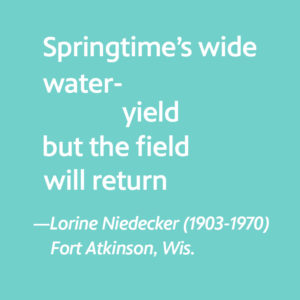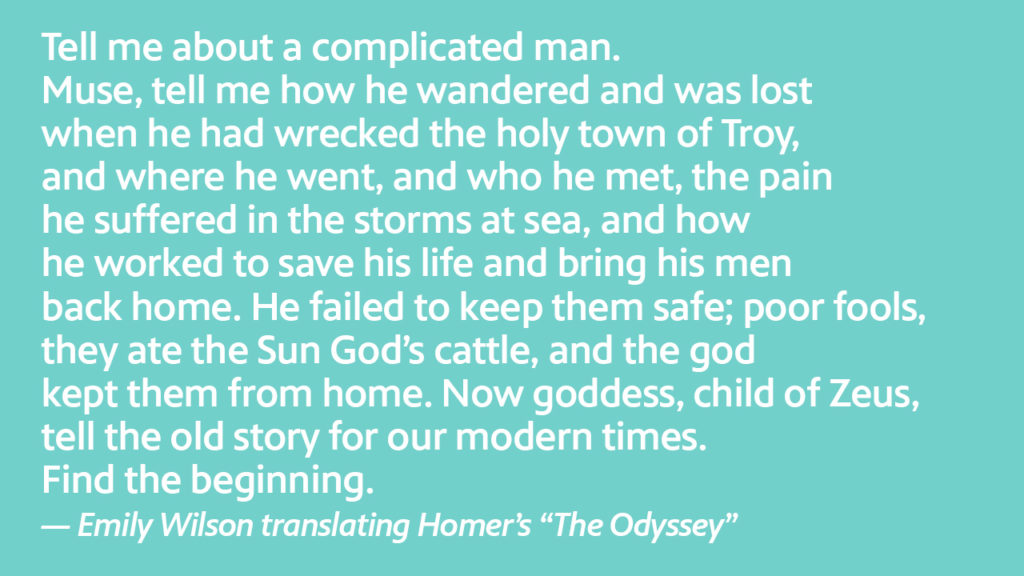The Academy of American Poets entreats us to “shelter in poems” for consolation, strength and connection. April is National Poetry Month, launched in 1996 by the Academy to share the importance of poetry and the integral role it plays in our culture.
This particular National Poetry Month, people are turning to poems more than ever for solace and hope. Poetry’s meticulous attention to words and their conscientious relationship to the page as well as oral tradition compel us to slow down and pay attention — offering respite in a simple line or flow of ideas that evoke beauty, reassurance or liberation.

PBS Wisconsin shares in the mission to deliver poetry to a wide audience. Our catalog of streaming video is rich with poetry programming and PBS Wisconsin Education, through its partnership with PBS LearningMedia, offers a collection of standards-aligned classroom resources on poetry for students PreK to high school.
We’ve found inspiration, escape, new knowledge and great joy getting (re)aquainted with the poets and scholars who follow. We invite you to take shelter with them as April ends, to carry you through the coming months.
__________
Hip-Hop U: The First Wave Scholars | PBS Wisconsin Documentaries
Produced in 2018, Hip-Hop U follows a group of UW-Madison students in the renowned hip-hop arts scholarship program First Wave. It showcases the art of “spoken word,” defined by the Poetry Foundation as “a broad designation for poetry intended for performance. . . characterized by rhyme, repetition, improvisation, and word play, and frequently referring to issues of social justice, politics, race, and community.” The clip below features First Wave student Miona Short performing “For All It’s Worth.”
Wisconsin Life | A partnership project of PBS Wisconsin and WPR
Season 5 of Wisconsin Life wove its episode “Rhythm Makers” around a visit to the former writing cabin of Fort Atkinson poet Lorine Niedecker (1903-1970). Niedecker wrote much of her spare yet vivid poetry in poverty and isolation on Blackhawk Island along the Rock River. Considered an important modernist poet — she is included in the Norton Anthology alongside Emily Dickinson — her work was largely overlooked until late in her life. Niedecker’s poetry is now understood as ahead of its time in its interrogation of the overlap(s) of politics, ecology and culture.
This season’s Wisconsin Life showcases New Berlin visual artist Nina Ghanbarzadeh. Born and raised in Tehran, Iran, Ghanbarzadeh takes the words of Persian poets and fabricates them into intricate pieces of visual art.
Grab your earbuds and enjoy these poetry themed installments from our Wisconsin Life partners in radio:
__________
Poetry in America | from American Public Television syndicated to PBS
In early April APT launched its second season of Poetry in America. Created and directed by Harvard professor Elisa New, it aims to bring poetry to classrooms and homes around the world. Produced in a rich documentary style, each episode offers a fully immersive experience hearing, reading, and interpreting a single American poem. Poetry in America gathers distinguished interpreters from all walks of life — athletes, poets, politicians, musicians, architects, scientists, actors, entrepreneurs and citizens — to explore and debate. This recent episode takes up the great modernist poet Elizabeth Bishop’s poem “One Art.”
__________
University Place | PBS Wisconsin
University Place, our “digital lecture hall” showcasing scholarly talks and community events that span topics and disciplines, routinely records talks covering poetry. One of many highlights in 2019 was a lecture by Emily Wilson, Professor in the Department of Classical Studies at the University of Pennsylvania. Wilson visited UW-Madison to discuss her new translation of Homer’s epic poem “The Odyssey.” The first woman ever to translate “The Odyssey” into English, Wilson’s work pursues new questions about a millenniums-old poem and the tradition of literary translation.

Enjoy six more University Place episodes exploring poetry:
- Rebel Poet – Louis V. Clark III, the author of “Rebel Poet: More Stories from a 21st Century Indian,” shares his poems which touch on discrimination, addiction, the struggle for community and the comfort of family.
- Writing Wisconsin’s Communities – Kimberly Blaeser, former Wisconsin Poet Laureate; Fabu, Former Madison Poet Laureate; Dion Kempthorne, Dean Emeritus at UW-Richland Center; and Timothy Yu, Associate Professor of English and Asian American Studies at UW-Madison, discuss how poetry and fiction can shape the future of our communities by engaging diverse populations.
- Race, Gender and Carceral Feminism – Fabu, Former Poet Laureate, Madison, WI, shares poetry that offers a glimpse into African American women’s experiences.
- American Poets on Death and Suffering in the Civil War – Beth Lueck, Professor, Languages & Literature, UW-Whitewater, discusses the poems written during the Civil War to come to terms with the death of loved ones and to bear witness to the losses. Poems focus on loss, displacement and sorrow.
- 2014 Wisconsin Academy Fellow: Robin Chapman – 2014 Wisconsin Academy Fellow Robin Chapman, Poet and Professor Emerita, Communicative Disorders, UW-Madison reads five of her poems.
- Repackaging Shakespeare’s Sonnets – Joshua Calhoun, Professor in the Department of English at UW-Madison, discusses how Shakespeare’s sonnets have been organized, printed and grouped over the centuries. Calhoun explores love and heartbreak in the poems.
__________
PBS NewsHour
Known as a trusted source of hard news, it is easy to overlook PBS NewsHour’s extensive and ongoing coverage of literature and the arts. Many of us at PBS Wisconsin rely on the NewsHour to introduce us to unfamiliar or emerging poetic voices and critics. They read poems and provide sharp commentary in this collection of clips. We start with a clip of poet Frannie Choi offering a reading of “Introduction to Quantum Theory” as part of the NewsHour segment “Brief But Spectacular.”
More of the PBS NewsHour on poetry:
- How Tongo Eisen-Martin looks to poetry to create revolution – Tongo Eisen-Martin’s Brief But Spectacular take on poetry as revolution.
- Poet laureate Joy Harjo opens a Native ‘doorway of hope’ – U.S. poet laureate Joy Harjo on opening a ‘doorway of hope’ for indigenous artists.
- Remembering Toni Morrison’s ‘beautiful human urgency’ – Jeffrey Brown reports and talks to Princeton University’s Tracy K. Smith, a former U.S. poet laureate, about how she was influenced by Morrison’s work, generosity and “amazing vigor.”
- A memoir of musical reverence to A Tribe Called Quest – A memoir by poet and cultural critic Hanif Abdurraqib reveals the “very personal” influence the group had on his own life. Abdurraqib sits down with Amna Nawaz to discuss.
- Poet Willie Perdomo on why he still writes letters – Poet Willie Perdomo shares his humble opinion on how a handwritten letter expresses more than just words.
- There is no ‘single story spun on a single tongue’ – Erica Dawson, a professor and writer, said she was surprised while on book tour recently to be faced with the same question over and over again, about speaking for “the black experience.”
- This poet put the plight of the Yazidi women into words – Learning about the horrors endured by Yazidi women at the hands of the Islamic State awakened something personal for Iraqi-American poet and former journalist Dunya Mikhail.
- A poet’s take on looking to language for ‘radical hope’ – Poet Ada Limón shares her humble opinion on why she sees people turning to poetry for language that reflects nuance, mystery and even “radical hope.”
- Poet Phil Kaye on his grandfather, traditional masculinity – Poet Phil Kaye remembers his grandfather and reimagines traditional masculinity.
- Kevin Young intertwines personal, public history in ‘Brown’ – In poet Kevin Brown’s collection, “Brown,” Young draws heavily on his boyhood in Topeka, Kansas, tying it in large and small ways to the wider world.
- A poet who holds ‘the men behind the music’ accountable – Imani Davis shares her poem “Platinum” and gives her Brief but Spectacular take on how society can overlook wrongdoing by famous artists.
- This poet wants brown girls to see themselves in their books – For girls who didn’t grow up seeing themselves as the main characters of books, award-winning poet Elizabeth Acevedo wants them to know that their stories are just as important as any other.
- Poet Rupi Kaur reaches new audiences in a new way – Rupi Kaur, one of Instagram’s favorite poets, writes about love, heartbreak and womanhood.
- Turning silence on police shootings into poetry – Hip-hop is the soundtrack to poet Marcus Wicker’s daily life, and his love for the music comes out naturally in his writing, which addresses topics like the violence perpetrated against black bodies.
- A poet’s response to ‘stand your ground’ – For Major Jackson, poetry is a vehicle of exploration. His poem “Stand Your Ground” responds to Florida’s law that was famously invoked in the killing of Trayvon Martin, a 17-year-old boy.
__________
American Masters, PBS
The long-running series American Masters delivers in-depth portraits of icons of American literature and poetry. Some of our favorites are below, beginning with a clip from “Maya Angelou: And Still I Rise,” in which she tells the origin story of her relationship to poetry.
- N. Scott Momaday: Words From a Bear – Delve into the enigmatic life and mind of the Pulitzer Prize-winning author and poet N. Scott Momaday, best known for “House Made of Dawn” and a formative voice of the Native American Renaissance in art and literature.
- Toni Morrison In Memoriam – Inspired to write because no one took a “little black girl” seriously, the writer and poet Toni Morrison published 11 acclaimed novels that illuminated the experiences of black America and inspired generations of writers.
- Worlds of Ursula K. Le Guin – Explore the remarkable life and legacy of late feminist author and poet Ursula K. Le Guin whose groundbreaking work, including “The Left Hand of Darkness,” transformed American literature by bringing science fiction into the literary mainstream. (PBS Passport membership required)
- Edgar Allan Poe: Buried Alive – Best known for his Gothic horror tales and narrative poem “The Raven,” Poe’s stories are the basis of countless films and TV episodes, and have inspired even more, as has his name and image. Determined to re-invent American literature, Poe was an influential – and brutally honest – literary critic and magazine editor, who also invented the detective protagonist with his character C. Auguste Dupin.
- Maya Angelou: And Still I Rise – Distinctly referred to as “a redwood tree, with deep roots in American culture,” Dr. Maya Angelou led a prolific life. She inspired generations with lyrical modern African-American thought that pushed boundaries. Best known for her autobiography, I Know Why the Caged Bird Sings, she gave people the freedom to think about their history in a way they never had before. (PBS Passport membership required for full show)
- The Day Carl Sandburg Died – Carl Sandburg’s life was like a tall tale. Yes, Sandburg was only a man. But, his words were Paul Bunyan; his words were John Henry: impossibly real. For much of the 20th century, Sandburg was synonymous with the American experience, a spokesman and writer on behalf of the people.


What do you think?
I would love to get your thoughts, suggestions, and questions in the comments below. Thanks for sharing!
Sigrid Peterson
The author has turned off comments for this article.